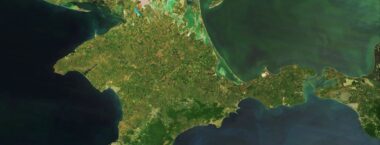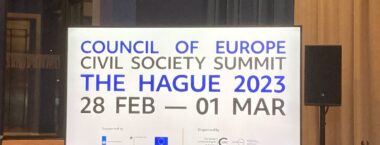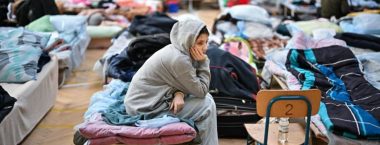
Statement of Human Rights Organizations Regarding Conviction of Crimean Activist Bohdan Ziza
On June 6, 2023, the Southern Area Military Court of Rostov-na-Donu sentenced Mr.Bohdan Ziza, a...
08 June 2023
27.09.2019
We, representatives of human rights organizations that have been documenting crimes and human rights violations on the occupied peninsula for the five years of Crimea’s occupation as well as helping victims of the conflict, call upon you to discuss our shared vision and cooperation opportunities.
The Autonomous Republic of Crimea and Sevastopol are an integral part of Ukraine, with over 2 million Ukrainian citizens living there at the outset of the occupation in February 2014. For 5 years now Crimeans have been held hostage by the criminal policies of the occupying power, the Russian Federation, every day falling victim to gross human rights violations and war crimes, as documented not just by human rights organizations but also by numerous international institutions (UN, OSCE, Council of Europe).
Every decision, every action of Ukraine’s leaders should be aimed at the liberation of the occupied territory and restoration of Ukraine’s jurisdiction. Meanwhile, public authorities should make every effort to ensure and protect the rights and freedoms of citizens that remain in the occupied territory or have been forced to leave it.
Unfortunately, we must report that over the course of these five years, residents of occupied territories and internally displaced persons have been suffering not only from the actions of the aggressor state, but also from violations of their rights and discrimination by the Ukrainian authorities. However, we believe that many of these issues can be resolved through a sensible, consistent and professional position of the President of Ukraine and his team.
Below you fill find the shared position of human rights organizations on the best ways to address the problems of IDPs and residents of the occupied territories in the context of human rights protection and humanitarian issues. By implementing these recommendations, Ukraine, in addition to fulfilling its obligations before its own citizens, will be able to take real steps toward protecting those affected by the conflict and building a lasting peace in the country.
Protecting political prisoners and Kremlin’s hostages
Description of the situation
The Russian Federation has unlawfully detained, for political reasons, at least 123 Ukrainian citizens in its territory and in the occupied Crimea, while at least 130 people – soldiers and civilians alike – are being held by Russia-controlled militants in the occupied territories of Donetsk and Luhansk oblasts. Despite this, Ukraine still has no comprehensive law that would protect such political prisoners and Kremlin’s hostages. This law must be in line with international humanitarian law and human rights standards, determine the status of all categories of persons unlawfully detained in the course of the armed conflict, clearly define the criteria for such persons as well as establish transparent and independent decision-making procedures when granting state aid to these persons and their families.
On July 11, the Ukrainian Parliament passed in the first reading the Draft Law “On the Legal Status and Social Guarantees for Persons Who Have Been Unlawfully Deprived of Their Liberty, Taken Hostage or Convicted in Temporarily Occupied Territories of Ukraine and Beyond” (No. 8205), but this law, unfortunately, is not that comprehensive solution that could ensure the protection of the rights of political prisoners and contains a number of provisions that could negatively affect the rights of these categories.
In addition, no negotiating platform has been created for systematic work toward the release of persons unlawfully detained in Crimea and Russia. The Minsk negotiations only concerns persons detained in connection with the hostilities in the east of Ukraine and so far have not resulted in the release of any of our citizens in the occupied Crimea and Russia.
Recommendations:
Regulating the sanctions policy
Description of the situation
Ukraine’s general sanctions policy and relevant legislation must be substantially refined in order to make the process of imposing sanctions more efficient, including sanctions on those responsible for human rights violations and war crimes committed in the context of the armed conflict with the Russian Federation. Thus, the Law on Sanctions contains a number of shortcomings that make Ukraine’s sanctions policy ineffective. The current sanctions legislation does not meet international standards and does not allow for reasoned appeals to partner countries that have, in one way or another, adopted the Magnitsky Act.
Recommendations:
Eliminating discrimination of Crimeans and IDPs from Crimea
Description of the situation
After the outset of Crimea’s occupation, Ukraine encountered a number of challenges due to the need to maintain legal, social, economic, cultural and other ties with the population of the occupied territories, as well as the need to protect and support IDPs. Unfortunately, the lack of a balanced and consistent state policy on IDPs has led to a number of systemic problems and discriminatory practices that IDPs have to contend with every day: Crimeans have limited access to education; they have been declared “non-residents” and effectively deprived of the ability to use banking services; they are not allowed to vote in local elections; they have no access to the administrative procedure for establishing births and deaths that occurred in the occupied territories (currently, no more than 20% of births and deaths that occurred in Crimea have been registered by Ukraine); they are facing restrictions when it comes to retirement benefits, etc. Furthermore, the checkpoints at the Crimean border, which lack the required conditions and facilities, as well as major difficulties with access to administrative services constitute the first obstacles for maintaining ties with the population of the occupied territories.
Particularly vulnerable here are certain categories of Ukrainian citizens that were being held in places of detention in Crimea at the time. There were at least 4,300 orphans and children deprived of parental care in Crimea at the time of Crimea’s occupation, and their fate is unknown. Russian authorities are forcibly imposing Russian citizenship on these children, allowing them to be adopted and taken outside Crimea. Also, according to human rights organizations, at least 4,000 Ukrainian citizens that had been kept in places of detention in the occupied Crimea were forcibly transferred to the Russian Federation.
Recommendations:
Developing a sustainable policy on overcoming the effects of the armed conflict
Description of the situation
Ukraine needs to develop approaches and ways to overcome the effects of the armed conflict and implement a national model of transitional justice, which will involve reparations to conflict-affected population, prosecution of those responsible for crimes, efforts to ensure that people know the whole truth about the course of events, as well as institutional reforms as a means to guarantee non-recurrence of the armed conflict. Unfortunately, no such vision has yet been developed at the state level. Moreover, the Criminal Code still has no provisions on crimes against humanity, while those on war crimes are not fully in line with international law. Systematic and effective documentation and investigation of occupation-related crimes is difficult due to the poor coordination and capacity of the appropriate Ukrainian law enforcement agencies. Furthermore, law enforcement agencies are forced to operate without access to the occupied Crimea and require constant communication with central authorities, human rights organizations, experts and embassies.
Recommendations:
Organizations engaged in the protection of victims of Crimea’s occupation and sharing a unified position on the development of a sustainable policy concerning Crimean residents and IDPs:
| Ukrainian Helsinki Human Rights Union
The largest association of human rights organizations in Ukraine that unites 29 human rights NGOs. UHHRU’s goal is to protect human rights. UHHRU considers itself part of the Helsinki movement and an adherent of the traditions and activities of the Ukrainian Helsinki Group for the promotion of implementation of the Helsinki Accords. Since the outset of Crimea’s occupation in 2014, UHHRU has been doing systematic work on the protection of conflict-affected population (litigation, analytics, advocacy).
Contact: Darya Svyrydova, +38(066)3981477, [email protected]
|
Media Initiative for Human Rights
Civic initiative that investigates and reports human rights violations in the context of Russia’s aggression against Ukraine. The initiative’s main focus is on cases related to the Maidan events, occupation of Ukrainian territory by Russia, and the anti-terrorist operation in the east of Ukraine. However, the initiative’s founders also closely monitor cases, lawsuits, trials as well as high-profile violations of people’s rights and freedoms that they consider important.
Contact: Maria Tomak, +38(050)3457457, [email protected] |
| ZMINA. Human Rights Center
ZMINA conducts awareness-raising campaigns and training programs, monitors and documents human rights violations, does research and analytics, as well as seeks change through national and international advocacy. The organization is engaged in awareness-raising, educational, monitoring and advocacy activities in the field of human rights, provides high-quality informational support for socially important civic initiatives, and provides expert support to human rights defenders and media outlets, disseminating only verified information. ZMINA also helps journalists, bloggers and civil society initiatives that operate in the occupied Crimea.
Contact: Tetyana Pechonchyk, +38(067)4459543, [email protected]
|
Crimean Human Rights Group
Initiative of human rights organizations aimed at promoting observance of human rights in Crimea by drawing public attention to the issues of human rights and international humanitarian law on the Crimean peninsula.
Contact: Olga Skrypnyk, +38(050)3971761, [email protected]
|
| CrimeaSOS
The organization’s activities are aimed at highlighting the unlawfulness of Crimea’s occupation and Russia’s oppressing policy toward Crimeans, at maintaining ties between the peninsula and mainland Ukraine, as well as at uniting Ukrainian society through the protection of the rights, freedoms and interests of internally displaced persons (IDPs) and others affected by the armed conflict in eastern Ukraine and Crimea.
Contact: Tamila Tasheva, [email protected]
|
Regional Center for Human Rights
The Center looks for legal solutions to issues faced by conflict-affected Crimeans. Established in Crimea, the organization relocated to Kyiv in 2014 after the beginning of the occupation. It consists of professional lawyers and advocates from Crimea with over 10 years of experience with litigation in international courts. The organization is currently handling about 50 cases in the European Court of Human Rights and has sent 6 submissions to the International Criminal Court.
Contact: Olga Androsova, [email protected]
|
| Association of Families of Kremlin’s political prisoners
The Association is a civic initiative started by families of Ukrainian citizens unlawfully detained by Russia to fight for their release. They also conduct regular awareness-raising campaigns in cooperation with other NGOs in Ukraine and abroad to draw attention to the issue of Ukrainian prisoners in Crimea and Russia.
Contact: Igor Kotelianets, +38(099)9429089, [email protected] |
Center for Civic Education “Almenda”
Founded and operating in Crimea prior to the occupation, the Center has since moved to Kyiv. Their focus is on human rights education projects, assisting Crimean youth in getting secondary and higher education in government-controlled territory, monitoring, analytical research, awareness-raising campaigns, as well as legal consultations on the exercise of the right to education by children from Crimea.
Contact: Valentyna Potapova, +38(050)6961019, [email protected] |
| Center for Civil Liberties
The Center was founded in 2007 to promote human rights values. Its work involves awareness-raising activities, implementation of human rights reforms, monitoring of political persecution in Crimea and Donbas, as well as participation in various international solidarity programs. The organization coordinates such initiatives as the Human Rights Agenda, Euromaidan SOS and LetMyPeopleGo.
Contact: Oleksandra Matviychuk, [email protected] |
Ukrainian Legal Advisory Group
The organization upholds national and international justice in the context of the armed conflict in Ukraine, aiming to protect human rights and freedoms during the conflict by litigating on behalf of people in domestic and international courts.
Contact: Nadia Volkova, +38(097)9441599, [email protected] |
[1] The draft law was developed by a group of human rights NGOs; its relevance and importance were discussed at the May 30, 2019 meeting of the President of Ukraine with human rights defenders and families of Kremlin’s prisoners.
[2] http://w1.c1.rada.gov.ua/pls/zweb2/webproc4_1?pf3511=63748
[3] Earlier, the following bill was developed with the help of human rights organizations and registered in the Parliament: http://w1.c1.rada.gov.ua/pls/zweb2/webproc4_1?pf3511=61425
[4] CMU Resolution No. 367 https://zakon.rada.gov.ua/laws/show/367-2015-%D0%BF
[5] Draft Law No. 9438 of December 20, 2018: http://w1.c1.rada.gov.ua/pls/zweb2/webproc4_1?pf3511=65266
If you find an error on our site, please select the incorrect text and press ctrl-enter.

On June 6, 2023, the Southern Area Military Court of Rostov-na-Donu sentenced Mr.Bohdan Ziza, a...
08 June 2023

On April 4, 2023, the Cabinet of Ministers of Ukraine (CMU) approved Order No. 288-r,...
03 May 2023

The Civil Society Summit on the Council of Europe (CoE) took place in The Hague...
31 March 2023

Since the beginning of the full-scale Russian invasion of Ukraine, about 150,000 civilians who fled...
17 October 2022